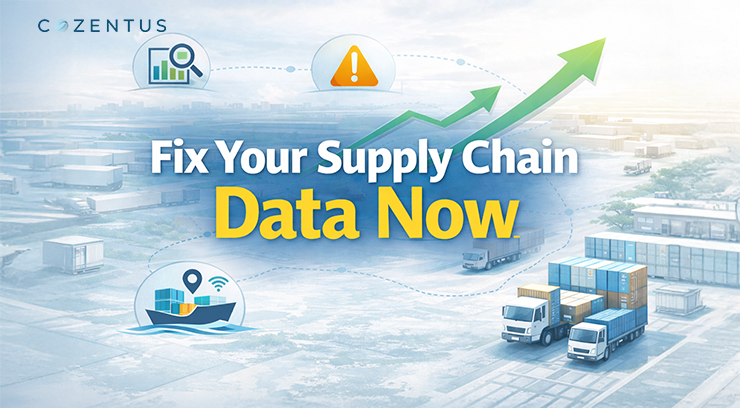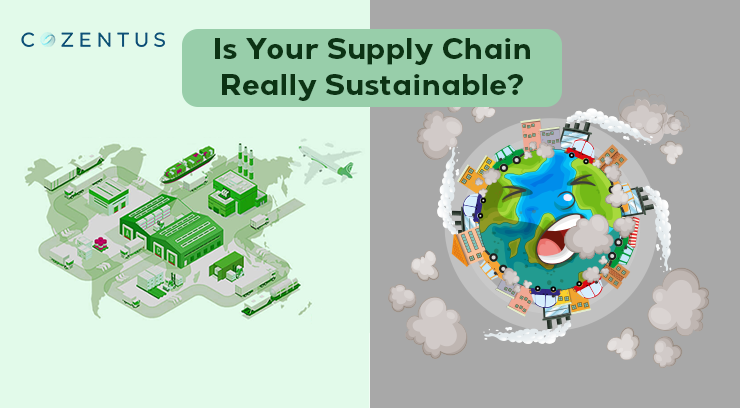Documents are vital in today's dynamic business culture because they facilitate information sharing and decision-making. Nevertheless, the traditional methods of processing these documents have become a major hurdle to achieving efficiency and accuracy.
Manual entry is time-consuming and also prone to errors. Further companies must manage a massive volume of unstructured data in a variety of formats including emails, papers, photos and PDFs. Thus a completely new approach is needed.
Intelligent document processing for Supply Chains
Intelligent document processing solutions are a significant advantage for industries such as supply chains, which deal with a variety of documents and formats in large volumes. Managing paperwork such as purchase orders, invoices, delivery notes, packing slips, regulatory forms and customs paperwork is part of the job of logistics management. Artificial intelligence-driven intelligent document processing is capable of extracting relevant data from different documents, be it unstructured, semi-structured or structured or even hand-written notes.
In order to give you insight into how you might utilize intelligent document processing (IDP) to revolutionize your business, this blog examines the principles of IDP and presents use case examples.
What does Intelligent Document Processing do?
A technique called intelligent document processing (IDP) collects and organizes data from documents to support business process automation.
Consider a scenario in the ecommerce industry where orders are sent to suppliers in times of low inventory. Despite being automated data, the order is not shipped until payment has been received. In general. After receiving an invoice from the supplier, the accounts team manually enters the data in their system before completing the payment.
This manual step often leads to bottlenecks and errors. These problems are avoided with IDP because invoice data is automatically extracted and accurately inserted in the accounting system. Leveraging machine learning (ML) and artificial intelligence (AI) technologies document processing automates and streamlines document management efficiently.
Key technologies used in intelligent document processing
Intelligent Document Processing (IDP) automates the extraction, processing and management of information from documents by utilizing a range of cutting-edge technologies. The following are some major IDP technologies:
Optical Character Recognition (OCR):
Converts many document formats such as scanned paper documents, PDF files or digital camera photos- into computer-readable and editable texts.
Natural Language Processing (NLP):
NLP makes it possible to process and understand human language. Text extraction, sentiment analysis and key phrase and entity identification are all done with NLP approaches.
Machine Learning (ML):
ML models makes use of algorithms to get knowledge from data and gradually increase the precision of data extraction.
Robotic Process Automation (RPA):
Optimizes data entry, validation and system integration—among the repetitious processes associated in document processing.
How does IDP work ?
Using cutting-edge AI technologies like generative AI, computer vision, machine learning (ML) and natural language processing (NLP), intelligent document processing (IDP) accurately receives, categorizes and extracts important information from documents.
- Pre-Processing.
- Data Extraction.
- Specific Data Validation.
- Specific Data Validation.
- Enhanced Validation.
- Data Export.
Difference between traditional approach and IDP:
Regardless of the volume of papers being processed or the size of the business IDP, is flexible and capable of handling the task efficiently. It greatly reduces the requirement for a lot of manual labor-intensive document processing and management.
Legacy Approach of ADP | Intelligent Document Processing (IDP) | |
| Scope of Processing | Focused mainly on scanning and digitizing paper documents. | IDP can understand, categorize, and extract data for additional analysis and insight production and digitizing. |
| Error Handling | Correction of errors or inaccuracies may need human intervention. | IDPs potential for self-learning allows it to gradually make corrections and increase accuracy. |
| Integration with other systems | To handle and utilize digital data, more systems or software could be needed. | Usually integrated to feed and use the gathered data directly into other enterprise systems (such as ERP, CRM, etc.). |
| Speed and Efficiency | Depending on the documents' complexity, there may be differences in speed and efficiency. | Because it can process vast amounts of complicated documents and get better over time, it is usually faster and more efficient. |
| Cost | Although initial prices may be reduced, eventual costs may rise due to manual error correction and increased software requirements. | Thanks to improved efficiency, precision and decreased manual involvement, sophisticated technology can result in significant cost savings over time, even though initial expenses may be greater. |
Benefits of Intelligent Document Processing (IDP):
Intelligent document processing (IDP) has the potential to significantly increase a company's overall profitability and customer retention. A few of the main benefits are as follows.
- Improved Efficiency and Accuracy.
- Reduced Cost.
- Better and responsive Customer Service.
- High Scalability.
- Enhanced Data Accessibility.
- Improved Compliance.
- Improved Document Accessibility
- Informed decision making
- Seamless Integration
- Flexibility and Adaptability
- Boost Employee productivity
Business Cases
Intelligent document processing technologies can extract and organize data for a variety of business purposes. Let us discuss some of them below.
- Intelligent document processing technologies can extract and organize data for a variety of business purposes. Let us discuss some of them below.
- Banking: Automate loan application procedures, scan paper records and gather information from bank accounts and invoices.
- Healthcare: For increased accuracy and quicker invoicing digitize patient records, handle insurance claims and extract data from medical forms.
- Logistics and supply chain: Automate processing of customs declarations, delivery receipts, proof of delivery, shipment manifests, bills of lading and inventory records.
- Insurance: Companies can use automation solutions to detect fraud, process claims faster, and analyze insurance documents for valuable insights.
- Manufacturing: Automate tasks involved in supply chain management, invoice processing, and quality control that require a lot of paperwork.
- Accounting and Finance: Accelerate tax filing and audits by automating financial report analysis, cost management and invoice processing.
- Retail: Automate processing of supplier invoices, inventory management and regulatory compliance and reporting for audits.
- Human Resources: Simplify the hiring process for new employees, manage resumes and applications, and get data from HR forms.
How Cozentus help to automate with IDP ?
At cozentus, we revolutionize the need for logistics document processing with expert insights and experience. We can handle any type of document, such as bills, invoices, shipping instructions, and more.
Just let us know what you need. Our solutions are highly customizable, ensuring a perfect fit for your specific needs. Our custom solution automates the processing of documents by extracting data, processing it, and integrating with other systems.
Our results:
- 80% of invoices now require minimal to no manual intervention.
- The system automatically posts extracted data to the Accounts Payable system, saving time and resources.
- The solution handles inter-BU invoice processing efficiently.
- We have reduced invoice processing time to 90%.
- Automatic data extraction minimizes errors by 50% .
- The solution easily adapts to new invoice formats and changing requirements.
- Improved Collaboration between stakeholders.
Final Thoughts:

Intelligent document processing is a new strategy. It changes how businesses use and get value from their large data sets. Businesses can use AI and machine learning to improve accuracy, manage documents efficiently, and gain valuable insights easily.
This new technology improves efficiency and allows teams to focus on more important tasks, changing the game for businesses. Intelligent document processing goes beyond selecting a tool. It requires embracing a future where strategic decision-making and operational excellence are crucial.
Recent Post
Subscribe to our newsletter
Stay updated on latest trends and news in the supply chain and logistics industry
Join our mailing list for monthly updates
Download Reports
AI-Powered Intelligent Document Processing -Your Launchpad to Digital Transformation
Download






